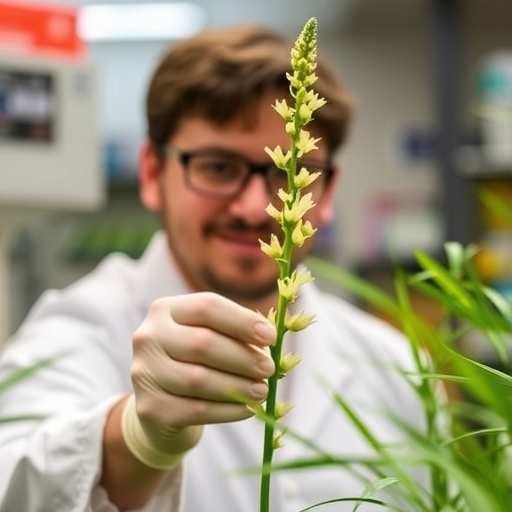The study of plant genomes has long captivated scientists, especially regarding the implications that ancient evolutionary events have had on their complexities. Researchers at the Salk Institute have recently made a groundbreaking discovery that challenges long-held assumptions about the redundancy of specific DNA regions within plant genomes. Their findings suggest that certain large duplicated sections of DNA can be deleted without affecting the viability of the plants, opening a new avenue for genetic engineering in plants.
With this study, which has far-reaching implications for biotechnology, researchers utilized CRISPR-Cas9 technology to conduct targeted deletions in Arabidopsis thaliana, a model organism in plant biology. By removing four large syntenic blocks of DNA from this plant’s genome, they were able to explore how its functionality might be impacted. The unique aspect here is that the deletions revealed minimal off-target effects, thereby reinforcing the promise of precision genetic work in plants.
As the complexity of plant genomes is often daunting, the Salk scientists discovered that, remarkably, two of the deletion lines exhibited no discernible phenotypic alterations, suggesting redundancy in these genetic regions. It leads one to consider whether the traditional understanding of the necessity of such duplicated regions is indeed flawed. This is significant in plant science, traditionally viewed through the lens of mutation and its impact on genetic expression.
The implications of this research extend beyond academic curiosity; they resonate deeply within the agricultural sector, where there is significant interest in streamlining plant genomes to favor certain traits. The research team has highlighted that removing extensive duplicated regions can accelerate the development of minimal plant genomes—a hallmark of success in agricultural biotechnology. This approach stands to create more efficient plant varieties that could be better suited to withstand environmental stressors and enhance crop yield.
Interestingly, the results have uncovered a notable phenomenon during their research. While gene expression compensation — where genes compensate for deleted counterparts — is expected, particularly in duplicated genes within a plant’s genome, the findings indicate that this was not a common occurrence in the tested deletion lines. Thus, this research provides insights not only into the redundancy of genetic features but also into the complexities of gene expression regulation in response to large deletions.
The study highlights the scientific endeavor’s experimental nature, as confirmation was achieved through rigorous whole-genome sequencing. This method facilitated a comprehensive understanding of the agronomic and functional consequences of large chromosomal deletions. With the genetic landscape of Arabidopsis thaliana being relatively well-mapped, the researchers used this knowledge to probe deeper into the implications of their deletions.
What’s particularly exhilarating about these findings is the potential philosophical shift in genetic engineering paradigms. Traditionally, deletions in plant genomes might have been perceived as posing risks that could disrupt vital functions. However, this study showcases a model in which significant genomic alterations do not impede viability. Thus, it opens the door to reevaluating how plant genomes can be engineered for desirable traits without the burden of maintaining every duplicated genomic fragment.
The research, while centered on plant genetics, also provides crucial considerations for synthetic genomics and biotechnology. With an increasing need for sustainable food sources amid changing climatic conditions, the ability to streamline genomes allows for versatile plant programming to enhance resilience in crops. Such engineering could lead to cultivars that thrive in harsher environments or offer quicker production times, a necessity for feeding a growing global population.
Beyond the potential applications of this work in agriculture, it could also inspire further studies into the evolution of redundancy and modularity within genomic structures. Understanding these principles could pivot research into how genes interact over time, contributing to the emergence of novel traits that enhance survival in fluctuating ecosystems. This offers a renewed insight into not just plant biology but evolution as a whole, invigorating discourse within the scientific community.
Credentialed researchers, including Todd Michael and Ashot Papikian, spearheaded this inquiry, contributing significantly to Salk’s mission of pushing scientific boundaries. Along with a team that included talents from various disciplines, these scientists exemplify the interdisciplinary collaboration required in today’s scientific inquiries to tackle the complex issues facing plant science and biotechnology.
The research is said to have been funded through the Harnessing Plants Initiative at the Salk Institute, highlighting the importance of collaborative efforts in facilitating advancements in knowledge that can eventually translate to real-world solutions. This funding demonstrates a commitment to innovations that promote agriculture’s role in combating global challenges, aligning closely with contemporary sustainability goals.
Overall, this study from the Salk Institute emerges as a crucial narrative in the ongoing quest to unlock the secrets of plant genomes and their evolutionary histories. The possibility of achieving viable plant varieties through targeted genomic deletions displays a newfound hope that could redefine how scientists approach the engineering of traits essential for future agricultural advancements.
Such research not only advances the fields of plant sciences and genetics but also invites society to reevaluate the harmony between human agricultural practices and nature’s intrinsic designs. The horizon ahead is filled with potential, and as we glean more insights from studies like this, the very nature of plant evolution and our stewardship over agricultural ecosystems continues to evolve.
Subject of Research: Plant genome modification through deletion of duplicated DNA regions
Article Title: Targeted deletions of large syntenic regions in Arabidopsis thaliana
News Publication Date: 11-Aug-2025
Web References: www.salk.edu
References: 10.1073/pnas.2419744122
Image Credits: Salk Institute
Keywords
Plant biotechnology, Plant sciences, Plant genetics, Plant genomes, Arabidopsis genomes, Plant development, Agricultural biotechnology




